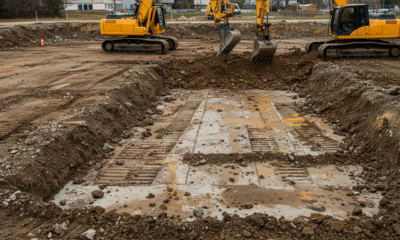

Environment
5 Ways the Construction Market Can Become Eco-Friendlier
A report from last March showed that the UK is halfway towards meeting its target of reducing its net zero emissions target after reducing emissions by 45% since 1990 even after increasing the economy by 80%. However, the country still has more work to do.
As the UK heightens efforts to reduce its carbon footprint, a growing number of industries are seeking ways to operate in an eco-friendlier manner. Although the country has done a better job sinceWith all the heavy equipment used in construction, finding ways to reduce carbon emissions will be a real challenge in 2023, but there are other areas within the industry where great strides can be made in the coming year and beyond. Let’s look at five of the things construction workers can do to work their way toward being a green industry.
1. Work Closely with Specialist Ecological Consultants
Reducing carbon emissions is just one area of what it takes to be an eco-friendly industry. Other areas like mitigating our impact on the natural environment are equally important. By working closely with specialist ecological consultants, we can do more than simply meeting government mandates on protecting the natural environment.
While it is necessary to have an initial ecological appraisal, it shouldn’t stop there. Perhaps there are no natural habitats that can be disrupted but project planners can find ways to enrich the grounds so that they become more attractive to species that benefit the environment. One of the suggestions often made is to plan for the addition of flowers and plants that attract bees and butterflies, two of the species responsible for pollinating plants of all kinds. That is going green in its most literal sense!
2. Use Sustainable Materials and Practices
One of the things which many people in the industry may not be aware of is the fact that there are literally thousands of products made with, or as a derivative of, oil and natural gas. That’s an astonishing number if you think about just how the drilling for fossil fuels is a huge part of the problem. Not only are we depleting our natural resources, but all the carbon emissions resulting from using equipment to do the drilling has an impact as well.
While it could be said that using natural products like oil and natural gas are eco-friendlier than chemical derivatives, finding a third option becomes all the more important. This is something that the construction industry isn’t actually responsible for doing, but it is important to stay apprised of alternative materials and practices that don’t involve petroleum in any way. In fact, the rising cost of petroleum is causing concern over how those petroleum-based products will rise in cost as well – just another reason to find environmentally-friendlier solutions.
3. Focus on Efficiency
It stands to reason that the more efficient we are when running heavy equipment, the lower our demand will be for petrol and diesel. This is something that every end of the construction industry can be evaluating to find ways to work more efficiently, thereby reducing the amount of time heavy equipment must be left running. By becoming a more fuel-efficient industry we can significantly reduce our dependent on fossil fuels.
4. Waste and Recycling
This is another huge area of concern in the construction industry, and that would be the waste that is produced. There is actually no way to get around the waste that results from construction, but it is possible to take the extra step to separate that which must go to landfills with waste that can be recycled.
It is understandable that the construction industry finds this a time-consuming process, but it will most definitely have a beneficial impact on the environment. Not only will it reduce the amount of waste overwhelming our landfills but it will provide a way to recycle materials to be used again in construction.
This is also something that will attract the interest of consumer groups around the country. It isn’t only industry that is highly focused on sustainability, but consumers are even more so. One of the ‘side benefits’ of waste reduction and recycling is that it will attract the attention of project developers who want to advertise their efforts in going green, starting with construction.
5. Partner with Green Supply Chains
Within the past few years, global supply chains have taken a major hit. However, it was never brought to a public awareness quite like the disruption of the supply chain during the recent global pandemic. That may have worked out for the better in that the world began to quickly see what a disruption of that magnitude could do to the economy. Many jobs were brought to a literal standstill because materials and supplies just weren’t getting to the industries reliant on them.
With that said, it should also be noted that the transport industry is by far the largest industry responsible for CO2 emissions which is why it behoves the construction industry to partner with transport services that are focused on greener operations. From planning routes more efficiently to ensuring each and every lorry is full before leaving a transport warehouse, every run can be that much more fuel efficient.
One of the suggestions being made at this time is to partner with transport fleets that use logistics managers to ensure efficiency in every aspect of their business. From the economical loading of vehicles to planning routes that are more fuel-efficient, there are ways to operate a green fleet, even in today’s world where trucks are powered by petrol products.
A Step in the Right Direction
In the end, every effort the construction industry makes toward operating in an eco-friendlier manner is a step in the right direction. There may not be a way to reasonably power those big lorries with anything but petrol and/or diesel, but that day is coming.
From the materials being used in construction to a significant reduction in waste as well as the concrete formwork suppliers you choose, there is always something that can be done to mitigate the damage being done to the planet. With greater efforts being made to prepare the grounds of major construction sites so that the end result benefits nature, there is always something which can be done to work toward an eco-friendlier construction industry.
Every step made today is a step in the right direction toward the goal of Net Zero in 2050 and that’s as eco-friendly as it gets.


 Environment12 months ago
Environment12 months agoAre Polymer Banknotes: an Eco-Friendly Trend or a Groundswell?

 Features11 months ago
Features11 months agoEco-Friendly Cryptocurrencies: Sustainable Investment Choices

 Features12 months ago
Features12 months agoEco-Friendly Crypto Traders Must Find the Right Exchange

 Energy11 months ago
Energy11 months agoThe Growing Role of Solar Panels in Ireland’s Energy Future




























